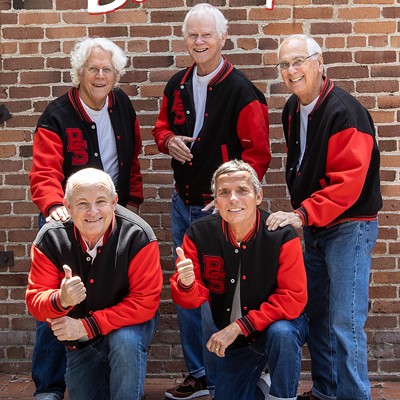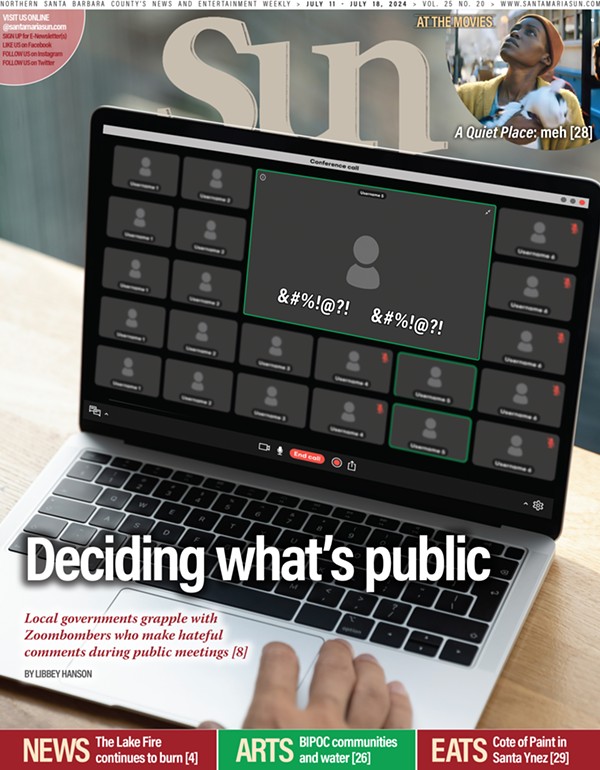Zoom calls from public comment participants are commonplace at city hearings in Solvang, but the popular platform was ironically not used by any speakers during a recent discussion on silencing certain kinds of virtual discourse in the future.

“I’ll point out that I keep looking at the screen to see if anyone has joined us,” City Attorney David Fleishman said at the Solvang City Council’s Nov. 13 meeting.
Fleishman explained that two prior meetings in October were flooded with multiple Zoombombers, or Zoom raiders, who aimed to disrupt both hearings with racist and inflammatory comments.
Although the remarks were unheard by in-person attendees, including City Council members, they were audible to those who accessed the meetings via Zoom, before staff ejected the Zoombombers.
“The comments that did make it through on Zoom last time were pretty inflammatory,” Fleishman said at the City Council’s Oct. 23 meeting, referring to the Zoombombing incident at the Oct. 9 meeting. “They were pretty awful. I did get a chance to listen to a couple of them.”
At the Oct. 23 meeting, the City Council directed staff to draft a policy on removing Zoombombers more seamlessly. Fleishman said that meeting was also plagued by Zoombombing during the public comment period for an item on Hans Christian Andersen Park improvements.
“It’s very difficult because we don’t know in advance, other than by the screen names that we see on the screen, whether or not someone is going to have a legitimate public comment until they start speaking,” Fleishman said at the Nov. 13 meeting, when staff returned with a Zoom policy proposal. “With some of them, we’ve had some advance warning just based on their names.”
One of the pseudonyms used was “Henry Himmler,” which tipped off staff that the user was “probably not someone who’s going to be making a comment about housing or pickleball courts,” Fleishman said.
“But we can’t always pre-suppose that,” added Fleishman, who described the proposed Zoom policy as setting up “guardrails” the council can use to cut off Zoombombers quickly, without deviating from First Amendment protections.
The proposal outlines a procedure for the mayor to follow in the event of a suspected Zoombombing, which includes automatically muting the suspect and issuing a verbal warning to stop using disruptive or derogatory language and allowing them one more chance to speak before being ejected if they don’t comply.
“There’s one step where the mayor would warn a ‘bomber’ before their exit, and I just don’t necessarily feel that that’s needed,” Councilmember Elizabeth Orona said after Fleishman’s brief presentation on the policy. “You guys have already shown us how quickly you can do it. I’m not sure we need that extra step.”
Councilmember Claudia Orona agreed and said including the policy in the instructions for the public to join meetings via Zoom is cautionary enough.
“They break them, they’re done. No warning,” Claudia Orona said.
“I think from a constitutional standpoint and a defensibility standpoint, that’s the reason we put in the warning,” Fleishman said. “If they’re not warned or don’t have an opportunity to cure whatever it is they’re doing, then it makes it look like we are making advance determinations of what their speech is going to be about. It’s prior restraint.”
Councilmember David Brown motioned to adopt the policy without revisions, which Elizabeth Orona seconded and was unanimously adopted.
“It’s kind of a tightrope at times, but we’re trying to provide the Council with the tools to stop the ones who are clearly outside the pale,” Fleishman said. “We want to make sure that we are consistent with the First Amendment by allowing people who do have legitimate issues, even if we may not agree with them, to speak and provide that comment to the council.”













